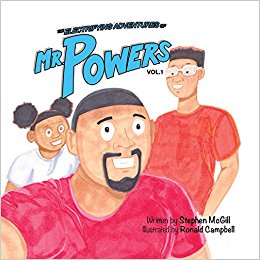 This past weekend, I attended the Baltimore Book Festival, a 3-day event located along Baltimore’s scenic Inner Harbor. I happened to share a tent with author/illustrator team, Stephen McGill and Ronald Campbell.
This past weekend, I attended the Baltimore Book Festival, a 3-day event located along Baltimore’s scenic Inner Harbor. I happened to share a tent with author/illustrator team, Stephen McGill and Ronald Campbell.
Stephen and Ron have a book that debuted in April, The Electrifying Adventures of Mr. Powers. I was immediately impressed by the way they pitched their book to readers. They sold out in the last hour of the last day of the festival, which is pretty much the definition of bringing exactly the right amount of stock.
I’ve attended a lot of book festivals in the past seven years, and I’ve heard a lot of pitches. It’s impossible not to hear your neighbors’ pitches over and over and over.
One year, I sat next to a woman who pitched her contemporary YA this way: “It’s about a girl who’s going through some dark stuff.” It felt like she was apologizing for writing the book and warning people away from it.
Another year, another event – I shared a booth with a picture book author who told everyone: “My book teaches an important lesson.” Story first, please! No one buys a book to learn a lesson. They buy a book to read a good story, and if a lesson is learned, it’s incidental.
I’ve also heard many long pitches that ramble on until the listener’s eyes glaze over. This hurts not only that author, but all the authors nearby, because as soon as there’s an opportunity, the listener will flee to a new, less intense location.
On Saturday, I chatted with Stephen McGill about these experiences, and he shared what must be the worst pitch ever. Earlier that day, he asked a neighboring author about her book, and her response was, “It’s a children’s book.”
“But what is it about?” he asked.
“I don’t want to say,” she replied with a coy smile. “You have to read it.”
Um. No. Just no.
 But Stephen and Ron had the perfect pitch for their book, which I heard approximately 300 times over the 3 days.
But Stephen and Ron had the perfect pitch for their book, which I heard approximately 300 times over the 3 days.
Mr. Powers is a single dad and also a superhero.
By day, he’s an entrepreneur, and by night, while his children are asleep, he’s keeping the world safe from bullies on the bus, monsters under the bed, and creatures in the closet.
Let’s break that down.
Mr. Powers is a single dad and also a superhero.
Ten words to encapsulate the main character and the premise. Come on, you’re hooked, right? Single dad. Superhero. How does he make that work?
The next sentence is an elaboration of the first one.
By day, he’s an entrepreneur, and by night, while his children are asleep, he’s keeping the world safe…
Now we know he’s a hard working business man, probably a role model in his community. We also realize his kids don’t know what he’s up to while they’re sleeping. Then finally, the humorous twist …
… from bullies on the bus, monsters under the bed, and creatures in the closet.
I laughed the first time I heard this part and realized what kind of villains Mr. Powers fights: the kind that bother his children.
Stephen and Ron adapted the pitch as needed. The word entrepreneur was for adults. When talking to kids, they substituted personal trainer or fitness guru, depending on the age of the listener.
Tweaking your pitch for the audience is important. My standard pitch for The Eighth Day is two sentences long:
A boy discovers a secret day of the week hidden between Wednesday and Thursday. Then he discovers a girl hiding in the house next door who exists only on that secret day and doesn’t experience the regular seven.
But that’s mostly for kids. I drop the second sentence and elaborate on the first ( … with ties to Arthurian legend and Celtic mythology) when talking to adults, older teens, and – yes, this happened once – if the kid is wearing a King Arthur T-shirt. When I’m talking to a teacher or librarian, I add: The Eighth Day has been on six state reading lists and counting!
The final part of a good pitch, which my tent-mates knew, is to stop talking. After two brief sentences, it’s time to let the listener speak, ask questions, and/or look at the book.
In summary, a good pitch has a hook that catches the audience’s attention in as few words as possible. This is followed by a sentence that elaborates on the main idea – and if you’ve got a humorous twist, use that to wrap up. Then, let the other person respond.
You can find Stephen McGill and Ronald Campbell on Twitter HERE and HERE and on Instagram HERE – and The Electrifying Adventures of Mr. Powers on Amazon HERE.
Hey Dianne! Good to hear from you.
They certainly had a good pitch, starting with the logline.
Those vague pitches don’t do anyone any good.
I always try to come up with the pitch before I even write the story – helps me know whether the story has legs or not.
“It’s a children’s book.” — Ha! Yeah, the coy smile does not make me want to read it either. Awesome advice!
Hi Dianne – what a great post … and how lovely to be sharing a tent with Stephen and Ron … though I did think at first you were sleeping in the same tent?!
Thanks – excellent to read – cheers Hilary
I’ve read up on pitches, and the writing workshop I went to last year had an agent do a presentation on pitching. It sounds like these guys really knew their stuff. You hit a lot of good points here, but I think the most important one is to figure out what to say to get someone interested quickly, which can be… difficult.
I still have a ways to go on my story, but I’ve already been working on the pitch. You can never start too soon.